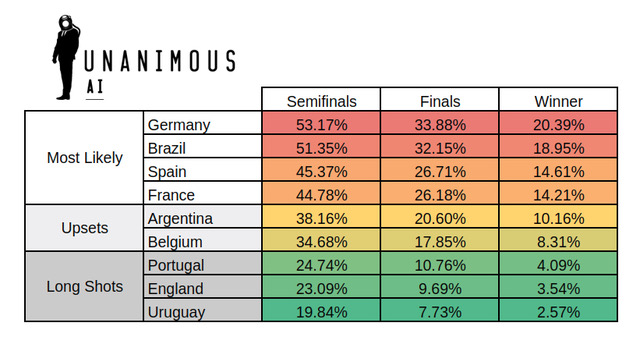Robots aren’t playing professional soccer just yet, but they can certainly help predict it! With the FIFA World Cup kicking off, San Francisco-based tech firm Unanimous A.I. has used its considerable artificial intelligence expertise to predict the outcome of the 32-team men’s soccer tournament. Given that the startup has previously predicted the Super Bowl results successfully right down to the exact final score, we totally think this is worth taking seriously.
“These predictions were generated using swarm A.I. technology,” Louis Rosenberg, founder and CEO of Unanimous A.I., told Digital Trends. “This means it uses a unique combination of human insights and artificial intelligence algorithms, resulting in a system that is smarter than the humans or the machines could be on their own. It works by connecting a group of people over the internet using A.I. algorithms, enabling them to think together as a system, and converge upon predictions that are the optimized combination of their individual knowledge, wisdom, instincts, and intuitions.”
The technology is modeled on the remarkable abilities of swarms in nature, such as swarms of bees, schools of fish, or flocks of birds. These natural swarms combine the insights of large groups in optimized ways. Unanimous’ swarms utilize this same principle to answer complex questions — such as giving precise probability-based outcomes on each game in the World Cup.

“Unlike traditional A.I. systems, swarm A.I. technology can tackle diverse problems very quickly without training on subject-specific data sets,” Rosenberg continued. “That’s because we are using the knowledge, wisdom, insights, and intuitions of real people, in real-time, and our algorithms have already trained on human behaviors. This training happened over tens of thousands of data points, and it means now we just need to build a ‘human swarm’ that includes people with knowledge about the World Cup.”
In this case, Unanimous A.I. partnered with a company in the U.K. called Colossus, which provided a group of 30 experienced sports handicappers. These handicappers were then connected together online, and combined with A.I. algorithms to amplify their intelligence. “It took a little over an hour, but this artificial ‘hive mind’ predicted every match and created a full World Cup bracket,” Rosenberg said. “We then processed the data and were able to generate [a] probabilistic forecast.”
Long story short? You should expect Germany to beat Brazil in the final, while Spain and France round out the tournament’s final four teams. Well, depending on how much stock you put in A.I.’s predictive powers, that is!
Editors' Recommendations
- I need to change how I use Apple tech in 2024. Here’s how I’m going to do it
- Even Microsoft thinks ChatGPT needs to be regulated — here’s why
- GTC 2020 roundup: Nvidia’s virtual world for robots, A.I. video calls
- IBM turned its Jeopardy-winning A.I. into the world’s smartest COVID-19 chatbot
- Because 2020’s not crazy enough, a robot mouth is singing A.I. prayers in Paris


